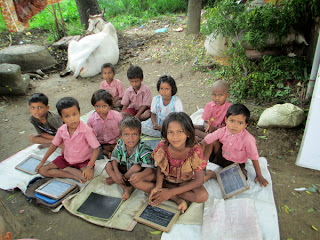Bihar is a State in India, where Lord Buddha, the founder of the Buddhist Religion is said to have attained enlightenment under the Banyan tree. Millions of Buddhists around the globe go on pilgrimage to this place.
But, in a small village in the Bihar sharif cluster, about 80 km from Patna, the capital city of the State of Bihar, the villagers are striving hard to build a community that will contribute to the spiritual and material transformation of society. I had the distinct opportunity of visiting the Bihar sharif cluster and meeting with the villagers and the chief of the village. To create such a society, it is essential that every one in the village be empowered to participate in the constructive process that will give rise to it. It is just happening in this small village of population 2,000. The village is called Hargawan. I visited this village during my recent trip to India and my trip was coordinated by Mr. Rajnish Singh, an Auxiliary Board Member (ABM), an appointed member of an Administrative Body in the Baha’i Faith.
I was accompanied to the village by Kumar Tiwari, aged 25, another ABM and Sandeep Kumar, Programme Coordinator for Society Of Universal Learner (SOUL) a Non-Governmental Organization working in India to bring prosperity and coordinate Baha'i literacy projects. SOUL is coordinating activities in about 17 schools in various communities in India. (5 in the State of Bihar, 5 in Madhya Pradesh, 3 in Chhattisgarh, 3 in West Bengal and 1 in Manipur) In villages, where the Indian public Educational system does not reach, these community schools provide preprimary and primary academic and moral education to young people. All day to day activities, hiring of local teachers and logistics are managed and implemented locally by a Board elected by the villagers. SOUL is focused on developing programs for training teachers. There are about 2 such community schools in Bihar Sharif cluster. One is in the village of Hargawan. Establishing a community school, the villagers promote not only the acquisition of reading and writing skills but also the spiritual empowerment of individuals and communities. These schools are called, Children's Garden School (a community school).
 |
| From left to right: Mr. Mr Sandeep Kumar, Author of the Blog and Mr. Rajnish Singh |
 |
| The public drinking water facility in the village Haragawan |
Hargawan village is located 10 KM towards south from District head
quarters of Bihar Sharif. The road to this village was rough but was very
interesting. The population of this village is about 2,000 and out of
which about 1,600 have gone through participation of core activities(
Core activities are activities that make up the core of Baha’i community
life worldwide. There are four generally recognized core activities:
devotional meetings, study circles, junior youth groups and children’s
classes)
I had the opportunity to meet 16-year-old, Puja Kumari, 6th in the family of 8 children in Haragawan. Every day, she volunteers and conducts Baha'i children classes and teach moral values, hygiene and other social issues to village children in her small but humble home. Her goal is to learn with the children and make the village and the world a better place to live. She wants to eradicate illiteracy among the villagers. India needs more Puja Kumaris.
 |
| Road to the village |
|
|
Most of the villagers are farmers. The farmers here earn less than
US$1.50 a day. The mud and
unpaved roads to these villages were very challenging. It is hard to find toilet or running water facilities in this village. But, the
villagers are just wonderful, friendly and good people. They are determined to build a community based on unity. They are determined to eradicate illiteracy and to promote the teachings of Baha'i Faith of uniting mankind.
The Local
spiritual Assembly of Hargawan work with the villagers to make sure
every child and youth receive proper education. The village headman of
this village Mr. Upandar Prasad (known as the Mukhia, which means head
of Panchayat) has got eight villages under his management. He believes
in the teachings of Baha’i Faith and encourages all the villagers in
these eight villages to participate in core activities to build a
prosperous, educated and a just society.
Two of his daughters
help conducting children classes in the village. Nearly 900 children in
Bihar sharif cluster have gone through attending children classes where
moral education is taught in addition to academic lessons. The village community and the Local Spiritual Assembly, a body elected by the Baha'is in this village to look after the protection and welfare of the community, take a community-based approach to face issues such as health, environment, caste and other social issues facing the community.
 |
| The villagers and the Head of the Panchayat gave me a warm welcome |
 |
| The author with the Head of the Panchayat |
 |
| The author with some of the members of the Village Board |
 |
| Children's Garden community school in Bihar Saharif |
Running a school for the village children, under a tree near her house - the children bring their books, sit and do their work on the mud floor. This is real. The only teacher is a 17-year-old young lady from the village, whom I met during my recent visit. The villagers have now donated a land to build a new school. Her goal is to educate the village children, giving them academic and moral education. She is a brave lady and she has my full support. Children's dream: To become teachers, nurses, doctors, government officials and lawyers.


















Comments
Schools in New-Delhi